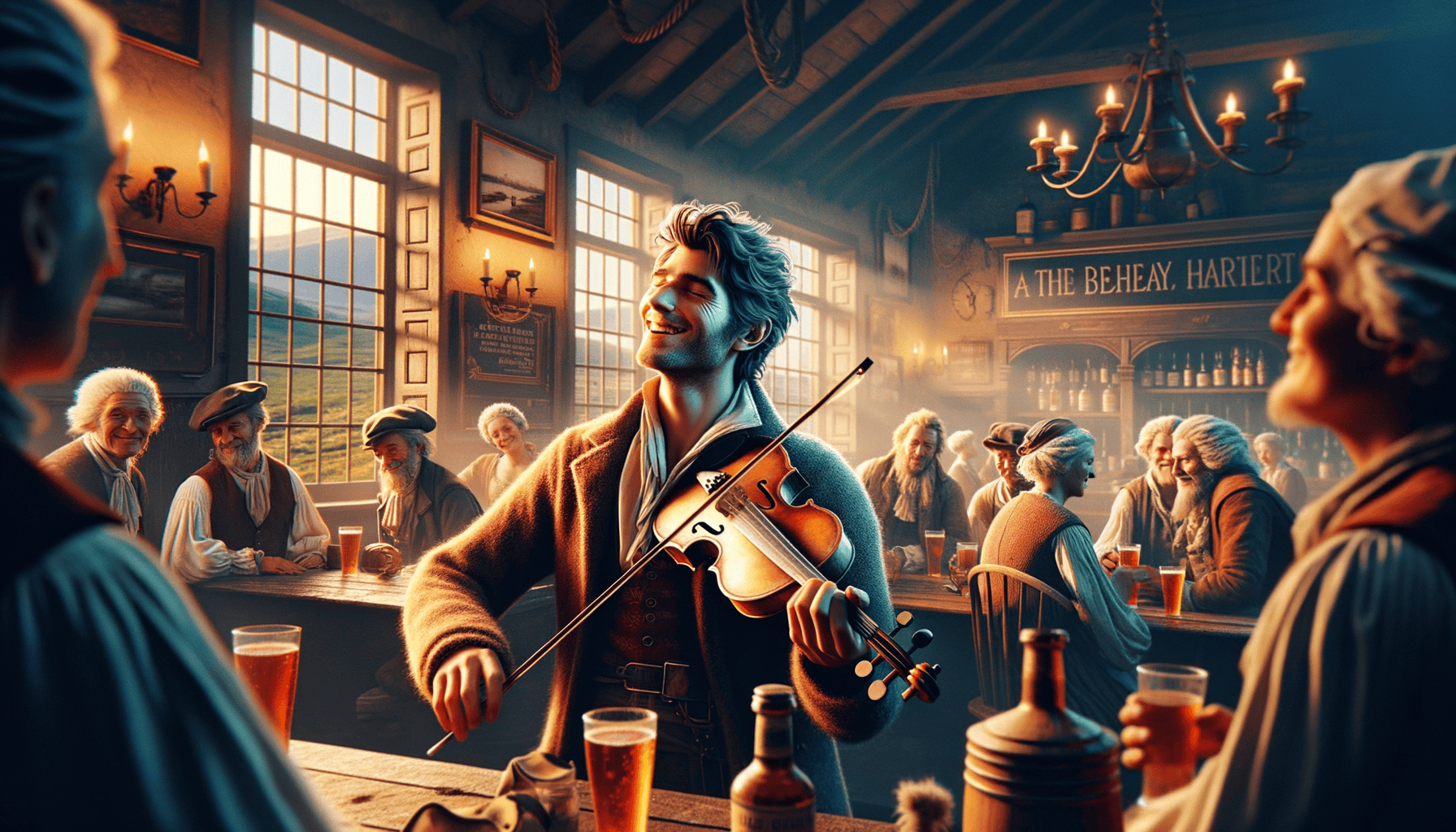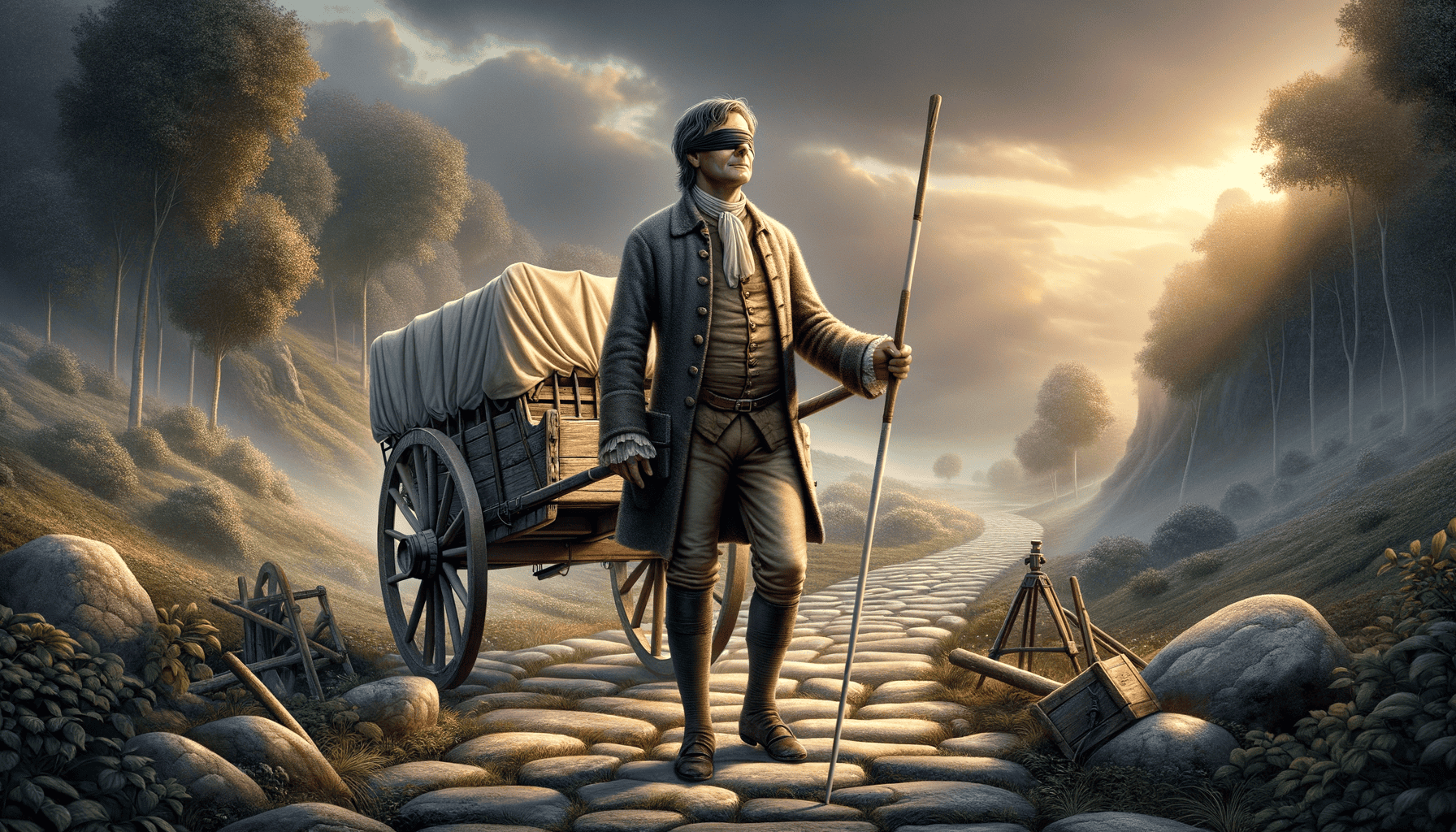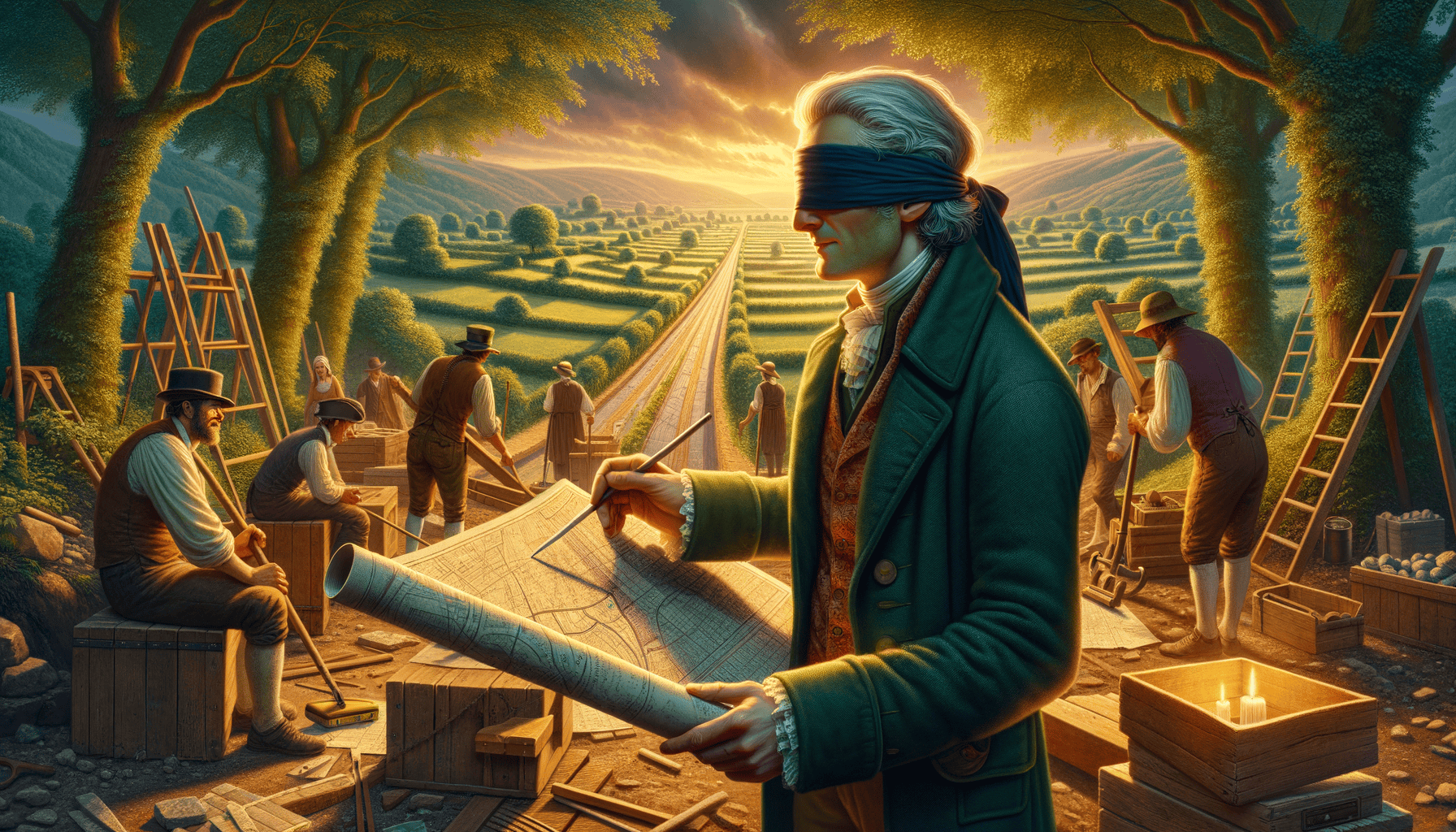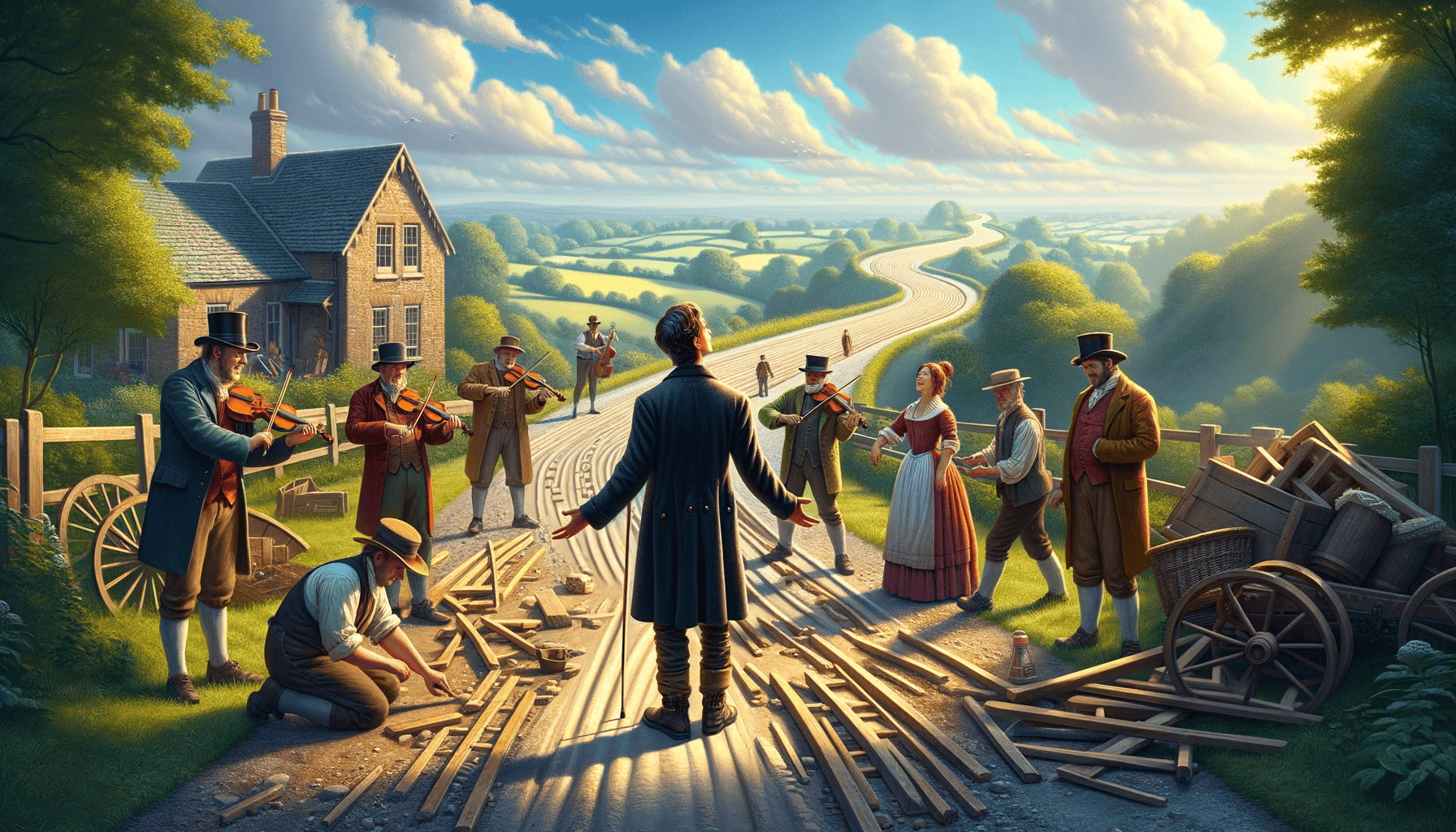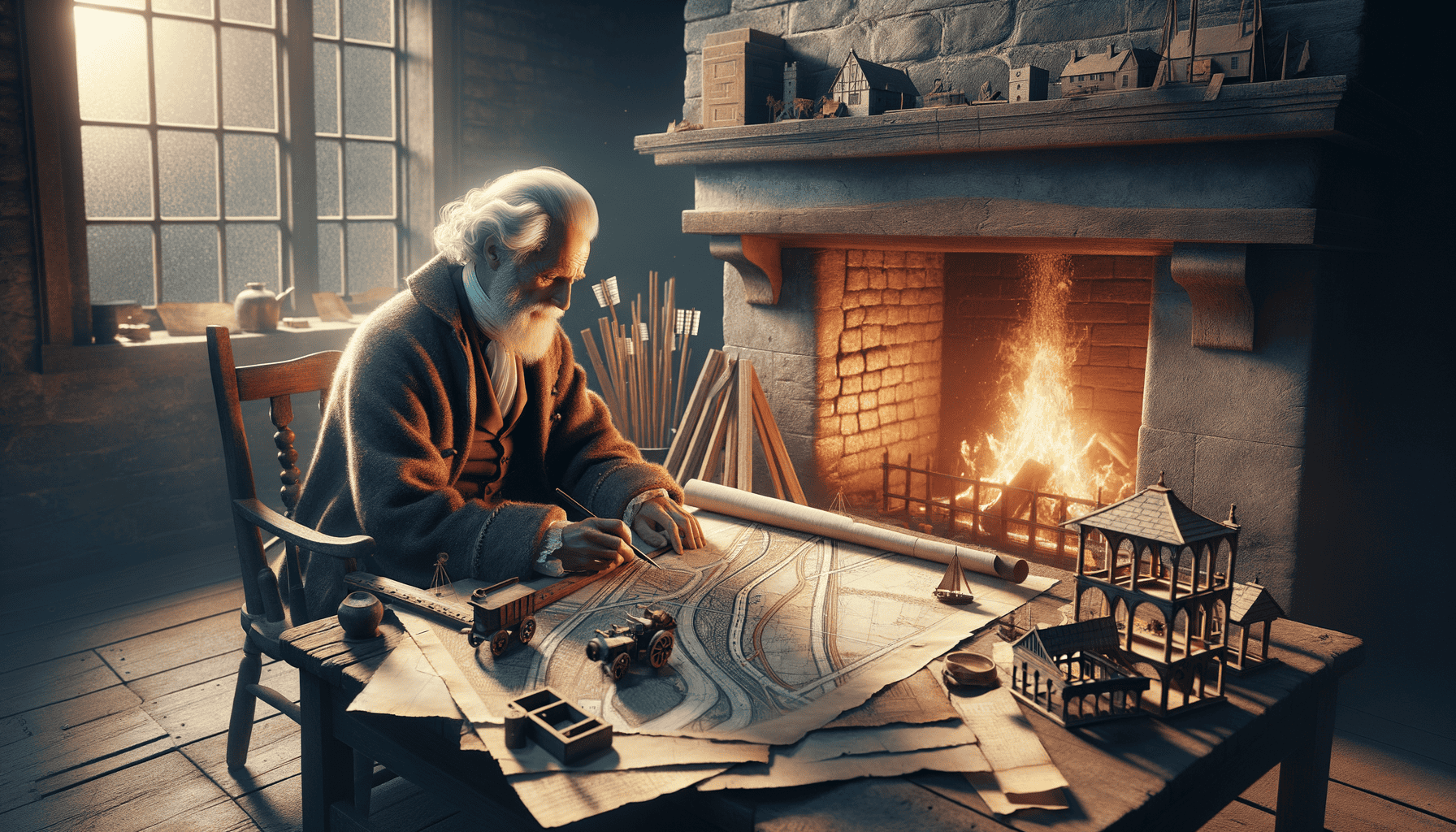Darkness and Light
Little John Metcalf loved to run and play in the streets of Knaresborough. The small English town was his playground in 1723, when he was just six years old. He would chase butterflies and climb trees with his friends, his bright eyes taking in all the sights around him.
"Be careful up there!" his mother would call as he scaled the tallest oak in their yard. John would just laugh, feeling the rough bark under his small hands.
But one day, everything changed.
John woke up feeling strange. His head hurt, and his eyes burned. "Mama," he called out weakly from his bed. "I can't see very well."
Mrs. Metcalf rushed to her son's side. "What's wrong, dear one?"
"Everything's blurry," John whispered. His mother's face was just a fuzzy shape above him.
The Darkness Comes
The doctor came to see John that day. He had caught smallpox, a terrible illness that was common back then. For days, John lay in bed with a high fever. When he finally got better, something was different.
The world had gone dark.
"Will I ever see again?" John asked the doctor, his voice trembling.
The doctor spoke softly: "I'm sorry, lad. The smallpox has taken your sight."
John's mother cried, but John didn't. Instead, he sat very still, listening to the sounds around him. He could hear birds chirping outside his window. He could feel the warm sunlight on his face. He could smell fresh bread baking downstairs.
Finding New Ways
"I may not be able to see," John told his parents, "but I can still do things!"
And he was right! John learned to use his other senses in amazing ways:
• He could tell where he was by feeling the ground under his feet
• He knew who was coming by their footsteps
• He could find his way around town by remembering every bump and turn in the road
His father made him a special stick to help him walk. Soon, John was moving around almost as well as before.
A Brave New Start
Other children sometimes teased John, calling him "Blind Jack." But instead of getting sad, John made it his nickname. He wore it like a badge of honor.
"Watch this!" he would say, climbing trees just as well as before. He couldn't see the branches, but his hands and feet knew exactly where to go.
Mrs. Thompson, their neighbor, was amazed. "That boy has more courage than most people with perfect eyesight," she told John's mother.
The First Challenge
One day, John heard about a swimming race in the River Nidd. "I want to join," he told his parents.
"But John," his father worried, "how will you see where to swim?"
John smiled. "I don't need to see the water, Papa. I can feel it."
On race day, John stood with the other boys at the riverbank. When the race began, he dove in. The cool water guided him, and the cheers from the shore helped him stay on course.
John won that race.
That night, as he sat by the fire with his family, John made a promise to himself. His blindness wouldn't stop him from doing great things. This was just the beginning of his amazing journey.
"Maybe I can't see with my eyes," he said, "but I can see with my heart. And that's even better."
A warm breeze drifted through the window, carrying the scent of summer flowers. John smiled, knowing that tomorrow would bring new adventures and new ways to prove that being different didn't mean being less capable.
A World of Sound and Touch
As young John grew older, he discovered amazing ways to understand the world without seeing it. He was now seven years old, and his other senses were becoming stronger every day. 🌟
The Music Begins
“Listen carefully, John,” said Mr. Barnes, the town’s fiddle player. “Can you hear how the bow dances across the strings?”
John’s fingers touched the smooth wood of a fiddle for the first time. The instrument felt warm and friendly in his hands. When Mr. Barnes played a tune, John’s face lit up with joy.
“I want to learn!” John exclaimed. “Can you teach me?”
“Music doesn’t need eyes, lad. It needs heart, and you’ve got plenty of that.”
Learning to Play
Every day, John practiced the fiddle. His fingers learned where each string was, and his ears told him when the notes were right. Soon, he could play simple tunes.
People in town started to notice:
• “Have you heard Blind Jack play?”
• “He makes that fiddle sing!”
• “Who would believe a blind boy could learn so fast?”
• “He’s got magic in those fingers!”
Finding His Way
But music wasn’t the only thing John was learning. He created clever ways to move around town by himself:
💡 He counted his steps between important places
💡 He memorized the feel of different roads under his feet
💡 He learned to use echoes to know when buildings were near
The Horse Whisperer
One day, John heard horses in the stable near his house. He loved their gentle sounds and warm breath. The stable master, Mr. Wilson, noticed John’s interest.
“Would you like to learn about horses?” Mr. Wilson asked.
“But how can I? I can’t see them,” John replied.
“Horses don’t care if you can see them or not. They care how you treat them.”
John learned to brush the horses, feed them, and even lead them around the yard. He could tell each horse apart by the sound of their walk and the feel of their coat.
Making Money
Soon, John had an idea. He could help deliver messages around town! He knew every street and path so well that he never got lost.
“Penny for a message delivery!” he would call out. People were amazed to see him navigate the busy streets with such confidence.
Mrs. Baker, the town baker, became one of his regular customers. “That boy’s worth his weight in gold,” she’d say. “Never makes a mistake with deliveries!”
Proving Them Wrong
Some people still doubted what John could do. One day, a man laughed when John offered to guide him to the next town.
“A blind boy as a guide? That’s ridiculous!”
But John just smiled. “Sir, I know every stone and turn on that road. I can tell you where the deep puddles are, where the best rest spots are, and which path is safest.”
The man decided to give John a chance. After their journey, he couldn’t stop talking about how amazing his young guide had been.
By the time John was ten, he had become famous in Knaresborough. Not as the blind boy, but as clever Jack who could do anything he set his mind to.
“Being blind just means I have to be smarter,” John would say with a grin. “And I like being smart!”
As the sun set each day, John would sit with his fiddle, playing happy tunes that floated through the streets. The music seemed to say what he felt in his heart – that every challenge was just a new adventure waiting to happen.
New Roads Ahead
The streets of Knaresborough buzzed with excitement. John, now a young man of eighteen, had become more than just the town’s favorite fiddle player. 🎻
From Music to Movement
“Jack, can you guide my wagon to York?” asked Mr. Thompson, a local merchant. “I hear you know every bump in the road.”
John smiled, his fingers tapping against his walking stick. “I can do better than that. I’ll drive your wagon myself!”
“But you’ve never driven a wagon before!” Mr. Thompson gasped.
“I’ve been studying wagons for months,” John replied. “I know every part by touch. Trust me.”
The First Journey
That first wagon ride changed everything. John sat tall on the driver’s seat, the reins firm in his hands. He could feel every movement of the horses, every shift in the road beneath the wheels.
🐎 The horses responded to his gentle commands
🛤️ His memory of roads proved perfect
🌟 People watched in amazement as he drove
A New Challenge
One rainy day, John’s wagon hit a terrible patch of road. The wheels sank deep into mud, and passengers complained about the bumpy ride.
“These roads need fixing,” John thought. He got down from his seat and walked the length of the bad section, his fingers and stick testing the ground.
“What are you doing?” asked Billy, his young helper.
“Learning how to make better roads,” John answered. “Feel this ground – it needs stones laid just right, with proper drainage.”
Learning the Trade
John started asking questions whenever he met road builders:
“How deep do you dig the foundation?”
“What size stones work best?”
“How do you make water flow away from the road?”
He created his own special way to survey roads. While others used their eyes, John used:
• His walking stick to measure width
• His feet to count distances
• His hands to feel ground slopes
• His ears to detect water flow
First Success
A local farmer needed a new road to his barn. “I’ll build it,” John offered.
“You? But how will you see what you’re doing?”
“I don’t need to see. I can feel what makes a good road.”
John gathered his workers and began. He taught them his special way of building:
“Layer the stones like this,” he’d say, demonstrating with his hands. “The big ones go deep, the smaller ones on top. Feel how they fit together?”
Word Spreads
The farmer’s road turned out perfect. Soon, other people wanted John to build their roads too.
“Blind Jack’s roads are better than any I’ve seen,” they’d say. “He understands the earth in a way others don’t.”
Even professional road builders started watching John work. They were amazed by his techniques.
“How do you get the slope just right?” one asked.
John grinned. “When you can’t see, you learn to trust your other senses. They tell you things eyes might miss.”
Growing Reputation
As John’s skills grew, so did his confidence. He wasn’t just building roads – he was building a future where people saw past his blindness to his true abilities.
“They used to call me Blind Jack,” he told his friend one evening. “Now they call me Master Road Builder. Funny how things change, isn’t it?”
The sun was setting over Knaresborough, and somewhere in the distance, the sound of wagon wheels rolled smoothly over one of John’s well-built roads. The sound seemed to echo his own journey – from a boy who lost his sight to a man who helped others find their way.
Building Dreams from Stone
The year was 1752, and John Metcalf stood at the edge of a busy turnpike, his walking stick tapping the ground thoughtfully. 🛣️
A Big Challenge
“They want me to build a road from Harrogate to Boroughbridge,” John told his wife Anne. “It’s three miles long!”
“That’s much bigger than anything you’ve done before,” Anne said, squeezing his hand.
“Yes, but I’m ready.” John’s face lit up with determination. 💪
Smart Planning
John gathered his team early one morning. The air was crisp and cool.
“First, we need to plan,” he said, kneeling to touch the earth. “Feel this ground – it’s soft and wet.”
John’s Special Road-Building Steps:
• Test the ground with a stick
• Lay big rocks at the bottom
• Put smaller stones on top
• Make sure water can flow away
Clever Tools
John created special tools to help him work. He had:
“A long rope with knots tied every yard to measure distance
A special stick to check how deep to dig
Wooden blocks to test if the road was flat”
Solving Problems
One day, the team hit a marshy spot that seemed impossible to cross.
“We’ll have to go around it,” said Tom, one of the workers.
John shook his head. “No, we’ll go through it. Bring me some bundles of heather and tree branches.”
John showed them how to lay the branches and heather first, then put stones on top. This made a strong base for the road, even in wet ground! 🌿
Working Together
“How do you know where to put everything when you can’t see it?” asked young Billy, a new worker.
John smiled. “I see with my hands and feet. Come here – I’ll teach you.”
He showed Billy how to feel the slope of the ground and test if stones were packed right. Soon, all the workers learned John’s special ways.
Making Progress
Day by day, the road grew longer. People came to watch them work.
“It’s amazing!” they’d say. “Blind Jack’s road is straighter than any other!”
John worked harder than anyone. He was first to arrive and last to leave. His hands got rough from touching stones, but his smile never faded.
Success!
After months of work, the road was done. Wagons rolled smoothly over it, horses trotted easily, and people walked without getting muddy feet.
“This is just the beginning,” John told Anne. “There are more roads to build, more ways to help people travel better.”
As they stood there, a coach rumbled past on the new road. The sound was like music to John’s ears – the sweet song of success. 🎵
New Opportunities
“Mr. Metcalf!” called a man’s voice. “We need a road built in Leeds. Will you help us?”
John’s face broke into a big smile. “When do we start?”
The sun was setting, casting long shadows across John’s new road. But for him, this was just the dawn of his road-building career. More adventures waited ahead, and he was ready for every one of them.
Roads of Glory
The summer of 1765 brought exciting news for John Metcalf. His roads were becoming famous all across England! 🌟
Big Success
“Papa, people are talking about your roads everywhere!” said John’s daughter Betty at breakfast.
“They say your roads stay dry even when it rains,” added Anne, placing a warm cup of tea in front of him.
John smiled, touching the rough calluses on his hands. “We’ve built 120 miles of roads now. But there’s still more work to do!”
A Special Visit
One morning, a fancy carriage stopped at John’s house. A man in fine clothes stepped out.
“Mr. Metcalf, I’m from Parliament in London,” the man said. “We want to learn about your road-building secrets.” 👔
• Harrogate to Boroughbridge
• Leeds to Huddersfield
• Wakefield to Halifax
• Many more across Yorkshire!
Teaching Others
“Can you show us how you build such strong roads?” asked the visitor.
John stood tall. “I’d be happy to! Let’s go to my newest project.”
At the construction site, John demonstrated his special techniques:
“First, feel the ground carefully
Listen to how it sounds when you tap it
Use the right-sized stones in the right places
Make sure water has somewhere to go”
Happy Workers
“Mr. Metcalf treats us like family,” said Tom, who had worked with John for years. “He teaches us everything he knows.”
“And he never gives up,” added Billy, now a skilled road builder himself. “If there’s a problem, we solve it together!” 🤝
Making History
People started writing about John in newspapers. They called him “Blind Jack, the Amazing Road Builder.”
“He’s built more roads than anyone else in Yorkshire,” wrote one paper. “And all without being able to see!”
A Proud Moment
One evening, John sat with his family by the fire.
“Papa,” asked his youngest son, “are you proud of your roads?”
John thought about all the people who could now travel safely. He remembered the doubters who said a blind man couldn’t build roads.
“Yes,” he said softly. “But I’m more proud that we showed people what’s possible when you believe in yourself.” ❤️
Looking Forward
“What’s next, John?” Anne asked, knowing that spark in his voice.
“There’s talk of new roads needed in Manchester,” he said excitedly. “And I have some new ideas about making them even better!”
As night fell, John walked outside. He could hear carriages rolling smoothly on his road in the distance. Each sound was like a pat on the back, reminding him that he had changed England’s roads forever.
His walking stick tapped the ground as he smiled, already planning his next big project. The best was yet to come! 🌅
A Lasting Legacy
The winter of 1810 found John Metcalf, now 93 years old, sitting in his favorite chair by the fireplace. His great-grandchildren gathered around him, eager to hear stories. 👴
Looking Back
“Grandpa Jack,” little Mary asked, “tell us about all the roads you built!”
John’s weathered face broke into a warm smile. “Well, my dear, we built 180 miles of roads in total. That’s like walking from here to London!”
• Built roads that lasted centuries
• Changed how roads were made
• Helped connect English towns
• Showed that disabilities don’t limit dreams
A Special Celebration
The town of Knaresborough organized a big party for John. People came from all over England. 🎉
“Your roads changed our lives,” said an old merchant. “My wagons don’t get stuck anymore!”
“And our children can go to school even when it rains,” added a grateful mother.
Teaching the Next Generation
John spent his final years teaching young road builders. He shared all his secrets:
“Listen to the earth beneath your feet
Trust your hands to tell you what’s true
Never let anyone tell you what you can’t do
Build roads that will last longer than you”
The Greatest Gift
“What makes you most happy, Grandpa?” asked Tom, his youngest great-grandson.
John touched the boy’s hand gently. “Knowing that long after I’m gone, people will travel safely on my roads. And maybe, when they hear my story, they’ll remember that nothing is impossible.” ❤️
Forever Remembered
Today, some of John’s roads still carry travelers through Yorkshire. His story is taught in schools, inspiring children to be brave and creative.
In Knaresborough, a statue stands tall. It shows Blind Jack with his surveying stick, forever watching over the roads he built with determination and love. 🗿
The Road Goes On
Every time wheels roll smoothly over an old Yorkshire road, they tell the story of a blind boy who refused to let darkness stop him from lighting the way for others.
John Metcalf’s legacy lives on in every mile of road he built, in every person who faces a challenge with courage, and in the hearts of all who believe that disabilities are just different ways of seeing the world. 🌟
And somewhere, perhaps, Blind Jack is still walking his roads, tapping his stick, and smiling at the sound of safe travelers making their way home. 🌅


